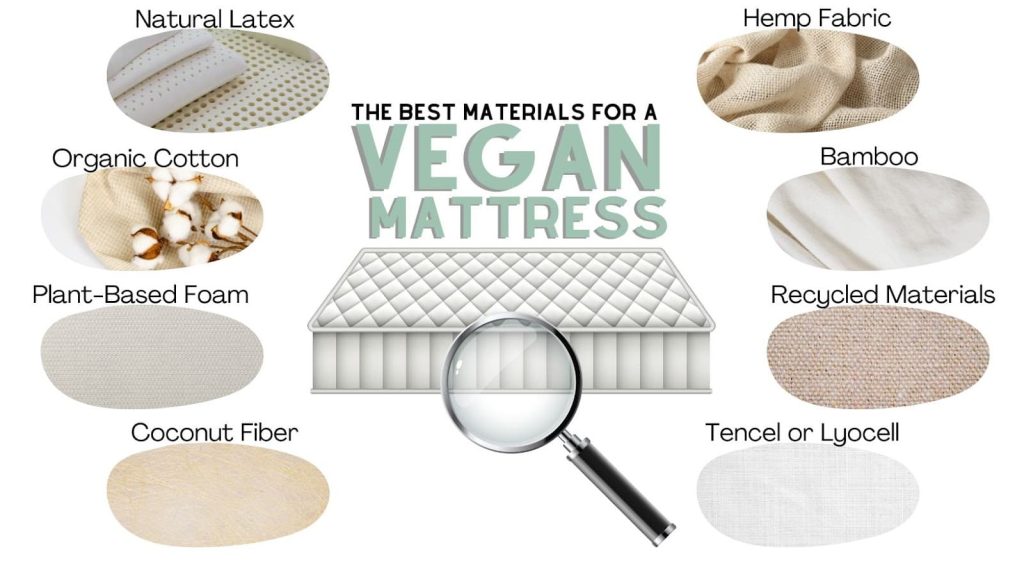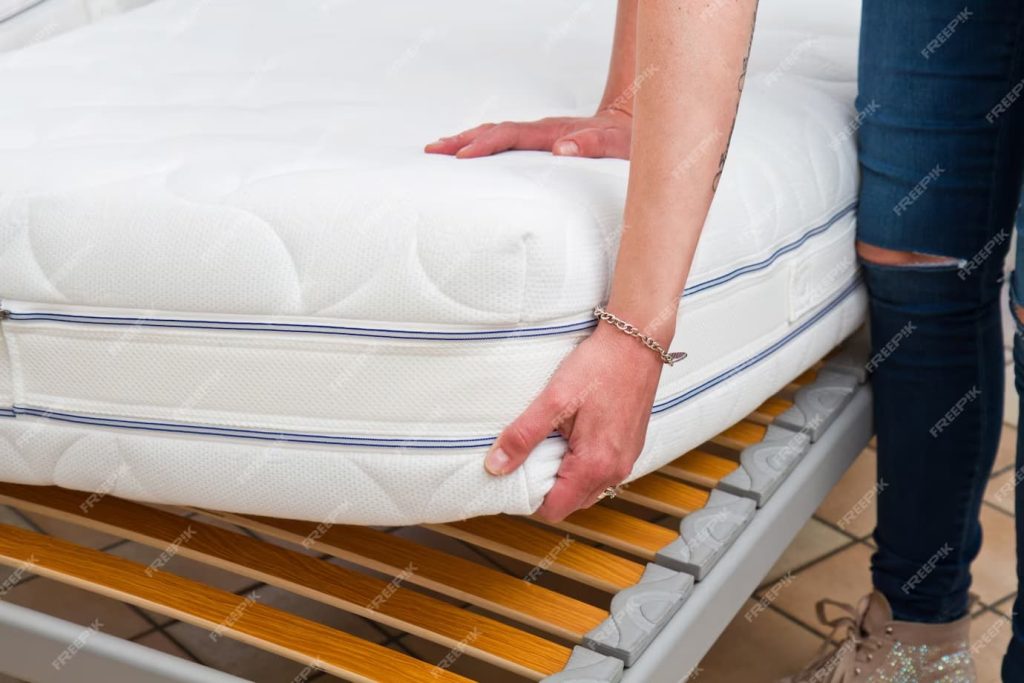A vegan mattress is a mattress that is made entirely from materials that are plant-based or synthetic. There are no animal products like wool or down in a vegan mattress, which makes them cruelty-free and better for the environment. Any manufactured or synthetic materials that are used in vegan mattresses are also produced with sustainable processes that limit the harmful effects on the surrounding environment and reduce waste. By choosing to buy a vegan mattress, you’re ensuring you receive a high-quality product that is durable and produced ethically. This article offers tips to help you find the perfect vegan mattress in New Zealand and what to look out for while shopping for your new mattress.
Tips for Finding the Best Mattress In New Zealand
With the numerous available mattress options, it can feel like a daunting task to find the best mattress in New Zealand that suits your needs and budget. Reading trusted mattress reviews that offer details about the mattress’s composition and insights into how the mattress was tested can go a long way to demystify the buying process. If you are looking for the next mattresses in New Zealand, then you should check out the post to discover which ones are most popular and why. The article takes an in-depth look at several important factors that you should consider when buying a mattress, like motion isolation, temperature control, and joint contouring to help you choose your ideal mattress.
What Are the Benefits of Buying a Vegan Mattress?
An obvious benefit of selecting a vegan mattress is that they are produced without inflicting any harm or cruelty on animals because none of the materials are derived from animals or animal products. Vegan mattresses are also made with sustainable materials like organic latex and organic cotton, as well as recycled materials to reduce environmental impact during the production process.
Vegan mattresses are an excellent choice for people who suffer from allergies because the materials used inside the mattress and on the outer layers are typically hypoallergenic and are less likely to trigger allergic reactions like eczema, sinusitis, and asthma. Similarly, vegan mattresses are also dustmite-resistant and antimicrobial which means that they inhibit bacterial growth and other types of infestations.
What Materials Are Used In Vegan Mattresses?
All the materials used in vegan mattresses are typically plant-based or synthetically manufactured. Vegan mattresses have several layers that incorporate different types of materials so that they are extremely comfortable and effective at reducing joint and pressure pain.
Some common materials that are used when manufacturing vegan mattresses include:
- Natural Latex
- Organic Cotton
- Plant-Based Foam
- Coconut Fiber
- Bamboo
- Hemp
- Recycled Materials
- Tencel or Lyocell
- Natural Rubber
- Cork
- Polyester
- Microfiber
These organic vegan materials like organic latex, plant-based foam, bamboo, and cotton are typically more expensive than animal-based products because they require more labor and resources to ethically grow and harvest the materials. But because these materials are so comfortable and durable most people don’t mind spending a little extra on a vegan mattress and actually consider it to be a worthwhile investment.

Understanding the Sustainability and Eco-Friendliness of Vegan Mattresses.
The production processes that are used with vegan mattresses use less energy and precious resources like water. They are also produced in ways that limit damage to the environment and help reduce water pollution and soil erosion. The vegan mattress manufacturing process also uses fewer chemicals and harmful substances which can cause illnesses in workers and allergic reactions in customers.
Vegan mattresses that are made with organic cotton, latex, coconut fiber, hemp, and bamboo are biodegradable and can also be recycled into other products when they are discarded. This means that vegan mattress producers make sure that every component of a vegan mattress can be composted or reused.
Common Non-Vegan Components in Mattresses and What to Avoid.
If you are looking for a 100% vegan mattress, you want to ensure that the mattress doesn’t have any animal products or other materials that are harmful to the environment. Any material that is produced with unethical processes that exploit people, animals, or the planet should be avoided.
Some non-vegan mattress materials that you will want to avoid are:
- Wool
- Down
- Polyurethane foam
- Petroleum-based foam
- Memory foam
While wool is soft, durable, and flame-retardant, it is shorn from sheep and causes allergic reactions in some people. Down can have the same effect on allergy sufferers and may even aggravate the skin of people who struggle with dermatitis. Similarly, non-vegan materials like memory foam and polyurethane foam can cause sleepers to get sweaty during the night which can cause overheating and skin rashes. So it is usually best to avoid mattresses made entirely of these materials.
Vegan Mattress Certifications and Labels To Ensure You Get What You Pay For.
Vegan mattress materials and the production processes need to undergo strict inspections and certification protocols to ensure that every aspect of their manufacturing adheres to the regulations and guidelines. When buying a vegan mattress in New Zealand you should look for a label on the mattress’s outer cover that indicates that the mattress is vegan certified.
Three of the major vegan certification labels you can look for on a vegan mattress include:
- A NZ Vegetarian Society Vegan Certified label
- Vegan Society Approved label
- PETA-Approved Vegan label

How To Care For a Vegan Mattress
When you invest in a vegan mattress you will also need to find out how to properly care for and clean it to ensure it lasts long. You will want to flip and rotate your vegan mattress regularly to prevent persistent lumps and bulges from forming. You should also place a mattress protector over the mattress to protect it against spills or accidents. Vacuuming your mattress regularly will remove dead skin cells, hair, and dust and prolong your mattress’s lifespan.
Never expose a vegan mattress to extreme heat or intense direct sunlight because these things can dry out and harden the mattress materials. You should also never use harsh chemical solutions and abrasives on a vegan mattress because these can destroy the natural fibers. Spot clean any spills with warm water and a mild detergent but never soak the mattress because that can cause irreparable damage to the mattress materials.
Mattresses with natural latex or coconut fibers need extra special care. Firstly, you never want to get a latex mattress wet because this can cause mold and mildew to grow in the mattress. Secondly, don’t over-vacuum or use suction that is too hard when cleaning a mattress with coconut fibers because this will damage the mattress’s composition.
Conclusion
Buying a vegan mattress is a good idea for people who want a hypoallergenic mattress that is also safe for the environment. Vegan mattresses comprise 100% natural or ethically sourced synthetic materials which make them wonderfully comfortable and an excellent choice for people who want to make sustainable choices when it comes to furnishing their homes. Vegan mattresses are not harmful to the surrounding fauna and flora and are completely biodegradable which makes them perfect for environmentally conscious consumers.


Published by